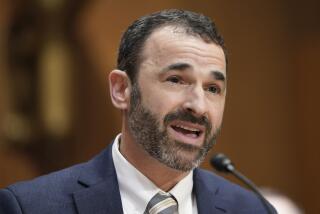IRS Seeks More Offshore Records
- Share via
The federal government Thursday widened its probe into offshore tax cheating, asking a federal court in Miami to grant it access to MasterCard International Inc. records on credit cards issued by banks in 30 countries used as tax havens by Americans.
A similar probe earlier this year identified hundreds of thousands of Americans who were holding assets in previously undisclosed offshore accounts.
If the latest summons is granted, as some accountants believe it will be, it will force MasterCard to turn over 1999, 2000 and 2001 records for U.S. clients that have credit cards issued by banks in countries the Internal Revenue Service identifies as tax havens, including the Bahamas, Bermuda, British Virgin Islands, Switzerland, Liechtenstein, Latvia, Luxembourg, Panama, Singapore and Hong Kong.
Tax experts say this latest request--a precursor to greater efforts by the government to crack down on tax evasion--will result in thousands of civil and criminal prosecutions over the coming years.
“Criminal prosecutions are going to skyrocket,” said Ian Comisky, partner in the Philadelphia law firm of Blank, Rome, Comisky & McCauley and coauthor of the book “Tax Fraud and Evasion.”
“The numbers are so massive that the question is going to be whether they’ll have sufficient resources to handle all the prosecutions,” Comisky said.
Between 1 million and 2 million Americans have offshore bank accounts, but less than 10% of them filed the required reports disclosing the accounts in the 2000 tax year, the IRS said.
The offshore accounts cost the government between $20 billion and $40 billion a year in lost tax revenue, according to General Accounting Office estimates.
Offshore banks, shielded by their nation’s privacy laws, rarely agree to release customer information to U.S. tax authorities.
Until last year, that left the IRS without the detailed information it needed to find and prosecute tax cheats who use these offshore havens.
However, the agency realized that many American citizens were using Visa, MasterCard and American Express cards to access their offshore cash, and launched a legal effort to get information on those credit card transactions.
In late 2000 and early 2001, courts in Miami and San Francisco granted the agency access to 1998 and 1999 credit card records held by Visa, MasterCard and American Express about accounts with banks in Antigua, Barbuda, Bahamas and Cayman Islands.
Those records have allowed the IRS to identify hundreds of thousands of individuals, trusts and U.S. corporations that are believed to be using offshore accounts to illegally evade taxes.
The IRS has developed hundreds of cases that have led to tax audits or criminal investigations based on this data, the agency said Thursday. Many more are expected.
“Offshore accounts have enabled people to evade billions of dollars of income taxes each year in the United States,” said Eileen J. O’Connor, assistant attorney general for the Justice Department’s tax division in a statement.
“The information obtained with the summons will help the IRS identify more tax evaders,” she said.
Based on the IRS’ previous success in obtaining court orders to get records for offshore credit card accounts, Comisky said the courts are likely to grant the agency’s latest request.
More to Read
Inside the business of entertainment
The Wide Shot brings you news, analysis and insights on everything from streaming wars to production — and what it all means for the future.
You may occasionally receive promotional content from the Los Angeles Times.










